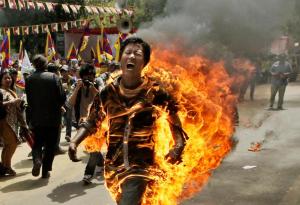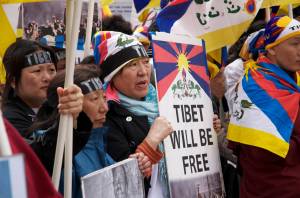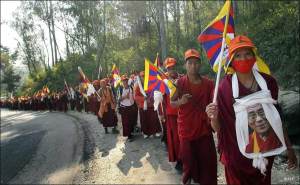History of Conflict:
The province of Tibet, located in Central Asia, bordered by the Himalayan Mountains on the South and the Kunlun Mountains on the North, struggles for independence as China continues to control the territory. Tibet and China have opposing opinions about who should have control of the province. Tibetans view themselves as an independent nation since they established their independence from Mongolian rule, however, Tibet lost its independence when China illegally invaded Tibet in 1950 in the Battle of Chamdo. The Battle of Chamdo led to the annexation of Tibet into the People’s Republic of China. Furthermore, China viewed Tibet as a declining empire since Great Britain’s’ invasion into Tibet for the purpose of creating a “buffer” between China and British India. In 1907, the Anglo-Russian Convention solidified the boundaries that identified British control in Persia, Afghanistan and Tibet. China reclaimed Tibet when Britain was in civil war in the middle of the twentieth century. United States and other nations agree that Tibet has failed to represent itself as an independent nation with its lack of participation in international organizations; therefore, China has the ability to maintain its assertion that Tibet was apart of China’s territory. In addition to the problem of territorial integrity, the Tibetans and Chinese clash with the differentiation in religion and ethnicity, as a consequence to the absence of independence in Tibet.
Perspective from China:
The majority ethnic groups in China, Han Chinese, live in Tibet and associate with the Chinese government. Han Chinese believe that Tibetans can be divided into those living in the Tibetan Autonomous Region and its neighboring provinces. China has concerns over foreign imperialism, believing if independence occurs in Tibet, it could spur other succession movements in Xinjiang, Taiwan, and Inner Mongolia. Although Tibet is deprived of political freedom, Tibet’s economy has grown with an increase in GDP and a higher standard of living. China refuses to accept Tibet as an independent nation as it has never been recognized as an independent nation by anyone in the world. China believes it pulled Tibet out of the darkness in 1950 when the Communists established control, thus resulting in profound social and economic progress.
Perspective from Tibet:
Tibetans want to be recognized as an independent nation. In order to achieve this independence from China, Tibetans advocate nonviolent means, following the Dalai Lama, with monks gathering in small protests to demonstrate against the injustices among human rights. However, nonviolent protests leads to violent uprisings as Tibetans get arrested and killed, with the Tibetans losing faith in the Dalai Lama’s peaceful approach. Tibetans believe that China’s modernization policies have hurt the region and the standard of living in Tibet has decreased. Tibetans are angered about how power is put into the hands of the Communist Party Secretary, who is Han Chinese. Because of the poor Chinese political system in Tibet, Tibetan religion, agriculture, and wildlife is threatened. The Communist Party of China places restrictions on religious freedoms and dictate farming methods that obtained poor harvests, leading to hunger and poverty. Tibetans clash with Chinese poachers on Tibetan reserves threatening wildlife unique to the land. These multiple issues make up the origins of conflict between Tibet and China.
Peace:
United States essentially has the greatest power that can generate a consensus on how to deal with Tibetan territory. The United States can reinforce the ideas of how China’s security is decreasing through the creation of fear and hatred among the Tibetan people. United States has a strong role in showing China governance the benefits of preserving Tibetan culture and assuring that Tibetans benefit from economic development being undertaken in Tibet. In order for peace, Tibetans should be appointed to head of all government offices in Tibet, gaining more control over politics. Tibetan language should be restored as the official language of Tibet’s government and schools in order to preserve Tibetan culture, while religious freedom and sustainable agricultural practices should be enforced. In addition to these resolutions, trust could be gained between the Tibetans and Chinese if the extremist goals and activities of the Tibetan community were moderated. However, with United States influence, China may be pushed to becoming a democracy.
Political Protest through self-immolation



It’s very interesting to see the lengths people are willing to go to protest. I remember in history class when I learned that the U.S. was afraid of the “Domino Effect,” which stated that if Vietnam fell to communist forces, then all the other neighboring countries would fall too. I think China is afraid that if Tibet gains independence, a “Domino Effect” would occur and Taiwan, Xinjiang, and Inner Mongolia would all gain independence. I also think the Dalai Lama is trying to imitate Gandhi in his “peaceful” approach to gaining independence. Although the U.S. is supporting some aspects of Tibet’s independence, the U.S. would never outright support the independence of Tibet no matter how desperate the Tibetans are because of how much the U.S. depends on China economically. The U.S. essentially needs to agree with China on critical issues to maintain stable relations. The same issue applies with Taiwan. Although the U.S. has naval forces in the Taiwan Strait to prevent China from outright attacking Taiwan and gives Taiwan financial aid, the U.S. would never forthrightly support Taiwan’s independence movement for the same reasons it wouldn’t support Tibet’s independence. What do you think the best solution to this conflict is? Do you think this conflict will ever end?
LikeLike
I don’t think the conflict will end in our lifetime, but eventually China’s government will change because no government lasts forever.
LikeLike
It is very sad to me to think that the Dalai Lama is losing his follower’s faith and trust. While the Dalai Lama stands for such a positive and powerful message, his nonviolent practices are proving to be very ineffective when it comes to fighting for their independence from China. If the people of Tibet want to be a free country then they might need to not rely on the nonviolent ways of the Dalai Lama, and become more economically sound by setting up a government that can handle itself in the world. I agree that the US should help, but we should be helping by informing the people of government and how to defend themselves against China and gain their independence. My question for you Kristen, is what do you think of what I have recommended, and how do you think the people of Tibet can gain their freedom, do you think that they will?
LikeLike
The conflict in Tibet won’t be solved unless China and Tibet create a compromise where China receives all of Tibet’s’ natural resources, while Tibet upholds religious freedoms. Although this change may not happen in our lifetime, I do believe this conflict will end in the future, as changes in the Chinese government will be implemented.
LikeLike
I think that while, occupation by a foreign country is illegal and should be fought against, it is not really a big deal in Tibet. The people of Tibet have only been mildly protesting against Chinese rule which shows that, no matter how noble the people are, if things were bad enough, there would be more of a struggle. It seems to me that China has not actually been exerting much of its influence in governing and changing Tibet and the people of Tibet have preserved their culture as a result. I think that the first step Tibet should take in securing its independence is to fight to become a member of the United Nations, like Taiwan, where it would get representation and be allowed to get its position across; then China would have a much better reason to take Tibet seriously. Also, I think that the United States should not get involved in the internal politics of East Asian nations as it should respect their sovereignty, but instead, try replacing all those mentions of the United States, to the United Nations. That would allow the most peaceful and diplomatic solution because both parties would have a say there.
LikeLiked by 1 person
I agree with your point about United Nations involvement, however, I don’t think it’s a fair point that Tibet is not protesting that much, because the oppression from the Chinese government is effectively blocking all Tibetan protests. People in Tibet don’t have an army or the resources to effectively get publicity around their protests, If Tibet had free speech, they would be protesting more aggressively.
LikeLike